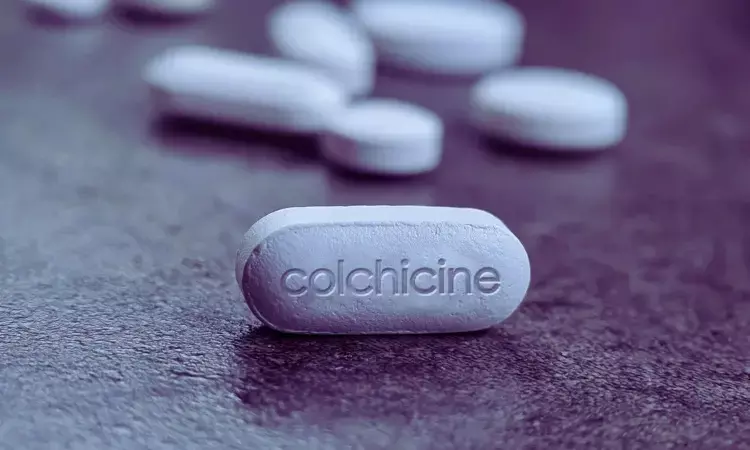- Home
- Medical news & Guidelines
- Anesthesiology
- Cardiology and CTVS
- Critical Care
- Dentistry
- Dermatology
- Diabetes and Endocrinology
- ENT
- Gastroenterology
- Medicine
- Nephrology
- Neurology
- Obstretics-Gynaecology
- Oncology
- Ophthalmology
- Orthopaedics
- Pediatrics-Neonatology
- Psychiatry
- Pulmonology
- Radiology
- Surgery
- Urology
- Laboratory Medicine
- Diet
- Nursing
- Paramedical
- Physiotherapy
- Health news
- Fact Check
- Bone Health Fact Check
- Brain Health Fact Check
- Cancer Related Fact Check
- Child Care Fact Check
- Dental and oral health fact check
- Diabetes and metabolic health fact check
- Diet and Nutrition Fact Check
- Eye and ENT Care Fact Check
- Fitness fact check
- Gut health fact check
- Heart health fact check
- Kidney health fact check
- Medical education fact check
- Men's health fact check
- Respiratory fact check
- Skin and hair care fact check
- Vaccine and Immunization fact check
- Women's health fact check
- AYUSH
- State News
- Andaman and Nicobar Islands
- Andhra Pradesh
- Arunachal Pradesh
- Assam
- Bihar
- Chandigarh
- Chattisgarh
- Dadra and Nagar Haveli
- Daman and Diu
- Delhi
- Goa
- Gujarat
- Haryana
- Himachal Pradesh
- Jammu & Kashmir
- Jharkhand
- Karnataka
- Kerala
- Ladakh
- Lakshadweep
- Madhya Pradesh
- Maharashtra
- Manipur
- Meghalaya
- Mizoram
- Nagaland
- Odisha
- Puducherry
- Punjab
- Rajasthan
- Sikkim
- Tamil Nadu
- Telangana
- Tripura
- Uttar Pradesh
- Uttrakhand
- West Bengal
- Medical Education
- Industry
Rare Case of colchicine toxicity Presenting With Euglycemic Diabetic Ketoacidosis: A report

USA: A recent article published in Cureus reports the case of colchicine toxicity with concomitant euglycemic diabetic ketoacidosis (DKA) in a man with long-term use of colchicine who was also prescribed dapagliflozin and clarithromycin.
Colchicine has a narrow therapeutic window and high toxicity risk when co-administered with P-glycoprotein and CYP3A4 inhibitors. Colchicine toxicity is linked with several metabolic disturbances and can lead to multiorgan failure and death. However, according to study authors Sean D Delshad and Angela Kleiber from David Geffen School of Medicine at the University of California, Los Angeles, Los Angeles, USA, there are no documented reports of colchicine toxicity initially presenting as euglycemic diabetic ketoacidosis.
The case concerns an 80-year-old man with a history of type 2 diabetes mellitus, coronary artery disease and gout who presented to the emergency room with abdominal pain and distention. The patient suffered a non-STEMI (ST-elevation myocardial infarction) two months before this presentation and underwent PCI (percutaneous coronary intervention). After PCI, the patient was started on dapagliflozin, and after hospital discharge, the patient experienced diarrhoea, abdominal bloating, and reduced appetite.
The patient sought care with his primary care physician, and a diagnosis was made of Helicobacter pylori infection. He was started on triple therapy with pantoprazole, clarithromycin, and amoxicillin. Then the patient experienced worsening diarrhoea, followed by constipation and progressively worsening diffuse abdominal distension and pain, for which he presented to the emergency department one week after initiating triple therapy.
On hospitalization, the patient's vital signs were within normal limits other than a heart rate of 111 beats per minute. Physical examination was notable for a markedly distended but soft and non-tender abdomen without rebound or guarding.
Upon admission, there was a concern for euglycemic DKA in the setting of dapagliflozin use, drug-induced agranulocytosis, and liver injury secondary to triple therapy. Triple therapy medications and dapagliflozin were withheld, and the patient was initiated on a dextrose infusion and an insulin drip.
Several hours after hospital admission, the patient developed shock with worsening acidosis and was transferred to the ICU (intensive care unit), where he required vasopressors. A computed tomography (CT) angiogram of the abdomen and pelvis revealed findings suggestive of non-occlusive mesenteric ischemia.
After treatment for euglycemic DKA, there was a sequential decrease in the beta-hydroxybutyrate level. However, there was an ongoing metabolic acidosis despite the patient's ketonemia resolution. At this time, the physicians obtained further history. The patient was revealed to be previously taking colchicine, which was removed from his medication list when he was recently started on triple therapy. The patient was diagnosed with colchicine toxicity as well as euglycemic DKA.
The patient had a slow improvement with supportive therapies but had a prolonged hospital course complicated by hospital-acquired pneumonia, recurrent hypotension, urinary retention, and recurrent ileus. The patient was ultimately discharged 26 days after admission.
The document stated, "Colchicine toxicity may initially appear to resemble other more commonly seen diagnoses such as sepsis and/or DKA given the effect of colchicine toxicity on multiple organs."
"The case showed the need for thorough history gathering and a high suspicion index for the diagnosis of colchicine toxicity," the authors wrote. "Colchicine toxicity may initially present with or as other more commonly seen pathologies and can result in multiorgan failure."
"Prevention of toxicity is key with suitable colchicine dosing and avoidance of interacting medications," they concluded.
Reference:
Delshad, S. D., & Kleiber, A. (2023). A Case of Colchicine Toxicity Presenting With Euglycemic Diabetic Ketoacidosis. Cureus, 15(5). https://doi.org/10.7759/cureus.39063
Dr Kamal Kant Kohli-MBBS, DTCD- a chest specialist with more than 30 years of practice and a flair for writing clinical articles, Dr Kamal Kant Kohli joined Medical Dialogues as a Chief Editor of Medical News. Besides writing articles, as an editor, he proofreads and verifies all the medical content published on Medical Dialogues including those coming from journals, studies,medical conferences,guidelines etc. Email: drkohli@medicaldialogues.in. Contact no. 011-43720751


